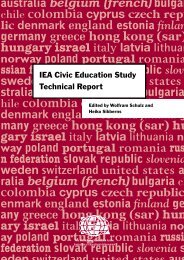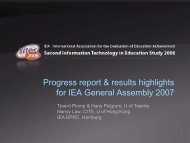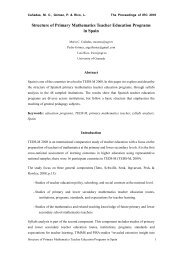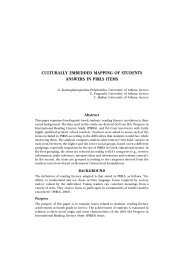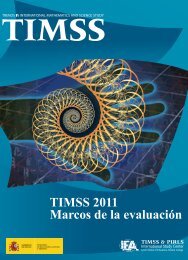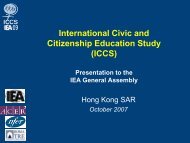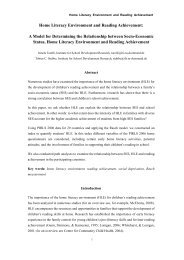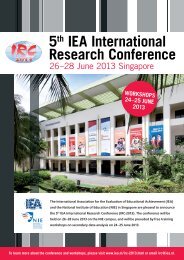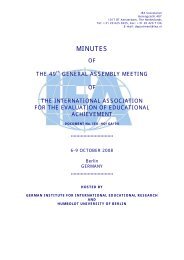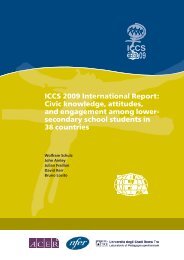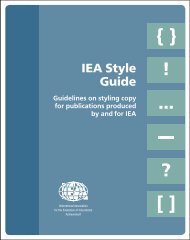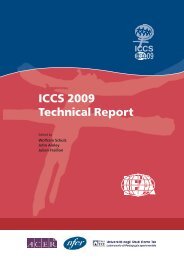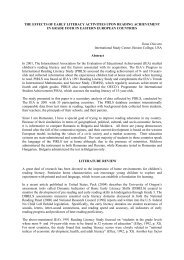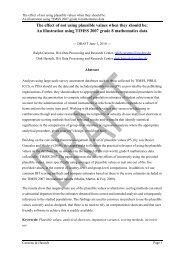Teacher Education and Development Study in Mathematics - IEA
Teacher Education and Development Study in Mathematics - IEA
Teacher Education and Development Study in Mathematics - IEA
Create successful ePaper yourself
Turn your PDF publications into a flip-book with our unique Google optimized e-Paper software.
PART 2: SPAIN<br />
147<br />
<strong>Teacher</strong> education<br />
Prospective teachers <strong>in</strong> Spa<strong>in</strong> participate <strong>in</strong> one of two dist<strong>in</strong>ct systems of <strong>in</strong>itial<br />
preparation. Those want<strong>in</strong>g to teach at the preschool or primary level undertake three<br />
years of tra<strong>in</strong><strong>in</strong>g <strong>in</strong> the education faculties of universities <strong>and</strong> receive the degree of<br />
diplomatura, which is considered a “first-cycle” degree. This degree requires 180 credits<br />
of both theoretical <strong>and</strong> practical tra<strong>in</strong><strong>in</strong>g <strong>in</strong> pedagogy. Prospective secondary teachers<br />
study toward a four-year second-cycle university degree <strong>in</strong> the subject they will teach,<br />
followed by a one-year pedagogical aptitude course (Sanz Vallejo et al., 2003).<br />
Accord<strong>in</strong>g to a recent report commissioned by the OECD, these two systems do not<br />
completely meet the needs of classroom teachers. While many commentators consider<br />
the primary-level tra<strong>in</strong><strong>in</strong>g for the diplomatura to be <strong>in</strong>adequate <strong>in</strong> terms of practical<br />
experience <strong>and</strong> subject-matter knowledge, secondary-level preparation receives<br />
criticism for be<strong>in</strong>g too academic <strong>and</strong> not sufficiently oriented toward develop<strong>in</strong>g<br />
competencies for effective teach<strong>in</strong>g. As a result of the perceived deficiencies of the<br />
secondary preparation program, the M<strong>in</strong>istry of <strong>Education</strong> <strong>and</strong> Science, along with<br />
collaborat<strong>in</strong>g universities, developed a replacement for the pedagogical aptitude course<br />
that will prepare teachers more fully for the realities of the classroom (Cros, Duthilleul,<br />
Cox, & Kantasalmi, 2004).<br />
<strong>Teacher</strong> recruitment <strong>and</strong> hir<strong>in</strong>g<br />
Spanish teachers teach<strong>in</strong>g <strong>in</strong> public schools (about two-thirds of students <strong>in</strong> primary<br />
<strong>and</strong> secondary schools attend public <strong>in</strong>stitutions) are hired on the basis of a twopart<br />
selection process that <strong>in</strong>cludes a competitive exam<strong>in</strong>ation <strong>and</strong> consideration of<br />
c<strong>and</strong>idates’ academic records <strong>and</strong> professional experience. The scores of prospective<br />
teachers are then used to compile a list of c<strong>and</strong>idates, with the number of applicants on<br />
it not exceed<strong>in</strong>g the number of advertised posts. <strong>Teacher</strong>s are chosen from this list <strong>and</strong><br />
assigned to schools by regional education authorities. Over the next six months, the new<br />
appo<strong>in</strong>tees are considered teachers <strong>in</strong> tra<strong>in</strong><strong>in</strong>g. After this time, they officially become<br />
permanent civil servants (Sanz Vallejo et al., 2003). In practice, the design of the system<br />
is strongly weighted toward the evaluation of teachers’ subject-matter knowledge rather<br />
than their pedagogical skills or ability because teachers who do not pass the exam<strong>in</strong>ation<br />
stage cannot cont<strong>in</strong>ue through the process. Also, the period dur<strong>in</strong>g which these teachers<br />
work as teachers <strong>in</strong> tra<strong>in</strong><strong>in</strong>g does not w<strong>in</strong>now out any who are <strong>in</strong>effective teachers (Cros<br />
et al., 2004).<br />
In addition to the formal hir<strong>in</strong>g <strong>and</strong> evaluation process described above, Spa<strong>in</strong> has a<br />
system of temporary contracts where<strong>in</strong> c<strong>and</strong>idates enter the system to fill short-term<br />
vacancies. However, these temporary teachers do not enjoy the same benefits, <strong>in</strong> terms<br />
of stability <strong>and</strong> salary, as civil servants. The teachers who fill these temporary posts are<br />
generally c<strong>and</strong>idates who have not made it to the f<strong>in</strong>al c<strong>and</strong>idate list via the competitive<br />
evaluation, but are nonetheless deemed competent enough to work <strong>in</strong> classrooms (Sanz<br />
Vallejo et al., 2003).<br />
<strong>Teacher</strong> salaries<br />
Spanish teachers are paid accord<strong>in</strong>g to a fixed schedule <strong>in</strong> which teachers receive,<br />
every six years, po<strong>in</strong>ts <strong>and</strong> commensurate salary <strong>in</strong>creases based on their hours of <strong>in</strong>service<br />
professional development <strong>and</strong> their teach<strong>in</strong>g duties <strong>and</strong> activities. <strong>Teacher</strong>s can<br />
also receive salary bonuses for participation <strong>in</strong> specific <strong>and</strong> additional professional<br />
development activities, assumption of managerial duties, <strong>and</strong> teach<strong>in</strong>g <strong>in</strong> disadvantaged



